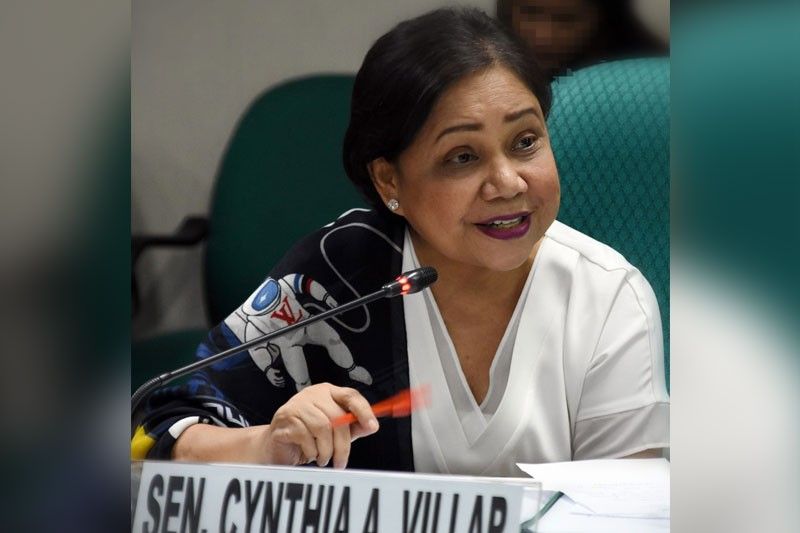Villar: Biz groups just want ease of doing business

MANILA, Philippines — Instead of amending the 1987 Constitution, business groups want the government to focus on the effective implementation of the ease of doing business law and addressing the problem of corruption, Sen. Cynthia Villar said yesterday.
Villar, whose husband Manuel Villar is dubbed the “brown taipan” and is said to be the country’s richest man, maintained that the ongoing proposal to amend certain economic provisions of the Constitution would not really make an impact on the economy. She noted that efforts to improve the country’s economy could be addressed through legislation.
“I have talked to other businessmen. Actually what they want is the ease of doing business and less corruption,” Villar told reporters during the Hog Festival 2024 in Quezon City.
Villar refused to reveal her position on the controversial proposal for Charter change as the Senate subcommittee on constitutional amendments, led by Sen. Sonny Angara, is still conducting hearings on the Resolution of Both House 6 to get the “pros and cons” on the proposed amendment.
She, however, pointed out that the efforts of the People’s Initiative for Reform and Modernization and Action (PIRMA) to amend the Constitution and push for a parliamentary form of government would not get the support of the Senate.
PIRMA is pushing for a people’s initiative, where Congress will vote as one or jointly, diminishing the power of 24 senators over 315 congressmen.
And even if RBH6 focused on the amendment of three economic provisions, Villar said she does not think opening up to foreign direct investors the public services, education sector and advertising industry would improve the economy.
“They always say economic provisions, but the economic provisions, they say, are minor. It’s not important. If you want to improve the economy, we can just legislate what we need to improve,” Villar added.
“Because this is what the businessmen say, actually their problem is the ease of doing business and then the corruption. That’s the only thing to reduce, we’re OK,” she emphasized.
Earlier, Senate President Juan Miguel Zubiri said President Marcos prefers to have a plebiscite for amending the economic provisions of the Constitution alongside the 2025 elections, as it will save the government P12 billion to P14 billion in expenses.
The Senate President said Marcos urged Angara to explore legal possibilities to convince the Commission on Elections (Comelec) to include the rider question in the 2025 election.
According to Zubiri, the President also reiterated that the Senate should lead the discussion on Charter change, and what should be discussed is RBH6 that was tabled in the Senate and not RBH7 of the House.
Techvoc experts
Experts in the technical, vocational and private education sector will be invited as resource persons in next week’s public hearing of the Senate subcommittee on constitutional amendments tackling the proposal for Charter change, Angara said.
Angara, tasked to conduct hearings of RBH6, said several personalities and experts from techvoc and the private education sector have been invited to the hearing on Tuesday.
His subcommittee had conducted three public hearings on RBH6: the first inviting legal luminaries, the second attended by business executives and the third hearing joined by private education institutions.
Earlier, Zubiri welcomed the statement of Comelec Chairman George Garcia that the poll body is amenable to holding a plebiscite on Charter change amendments together with the 2025 midterm elections.
“I agree with the position of the Comelec. With limited resources and competing priorities, it is imperative that we maximize every peso spent to address the most pressing needs of our citizens, and it also aligns with the vision of the President for the country,” Zubiri said.
The findings of the House Congressional Policy and Budget Research Department (CPBRD) underscore the need to amend the restrictive economic provision in the Constitution to boost the country’s growth and development, the Foundation for Economic Freedom (FEF) said yesterday.
“The study conducted by the CPBRD is a good beginning. We hope they will continue with their untiring effort to provide more and up to date information that will help convince our policymakers and the general public of the net benefit of removing these restrictive economic provisions in our 1987 Constitution,” said the FEF, which had been vocal in backing moves to change the Charter.
The FEF agreed that the Philippines is “still the most restrictive among the ASEAN 5 countries and number 3 globally among 83 countries in 2020.”
When it comes to restriction, FEF noted that the Philippines had the “largest equity restriction,” followed by Indonesia, Malaysia, Thailand and Vietnam, which had the least equity restriction.
The FEF asked the CPBRD to re-check with the Department of Trade and Industry and various foreign chambers and “try to arrive at a consensus on the most serious binding constraints to more foreign direct investments.” — Sheila Crisostomo
- Latest
- Trending






























